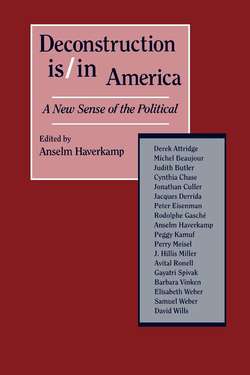Deconstruction Is/In America

Реклама. ООО «ЛитРес», ИНН: 7719571260.
Оглавление
Anselm Haverkamp. Deconstruction Is/In America
About NYU Press
Deconstruction is/in America
Contents
Acknowledgments
Contributors
Deconstruction is/as Neopragmatism?: Preliminary Remarks on Deconstruction in America
Notes
The Time is Out of Joint
I
II
III
Notes
1 Deconstruction and the Lyric
Notes
2 Reading Epitaphs
Notes
3 Upping the Ante: Deconstruction as Parodic Practice
Notes
4 The Disputed Ground: Deconstruction and Literary Studies
Notes
5 Une drôle de classe de philo
Acknowledgments
Notes
6 Going Public: The University in Deconstruction
Notes
7 Possibilizations, in the Singular
Notes
8 Writing Resistances
Notes
9 Presentness and the “Being-Only-Once” of Architecture
10 Burning Acts: Injurious Speech1
Postscript
Notes
Bibliography
11 Republic, Rhetoric, and Sexual Difference1
Notes
12 The Test Drive
Testing 1
Testing 1, 2
Testing 1, 2, 3
13 Ghost Writing
Notes
Bibliography
14 The Form of Politics
I
II
III
Notes
15 At the Planchette of Deconstruction is/in America
Acknowledgments
Notes
16 Jaded in America
Notes
Отрывок из книги
Thank you for buying this ebook, published by NYU Press.
Sign up for our e-newsletters to receive information about forthcoming books, special discounts, and more!
.....
If I chose this title, “The time is out of joint,” would it be merely so as to recall these supplementary disturbances of an abyssal mourning or just to attempt in vain to make up for my own lateness? No, it is also out of fidelity, out of a taste for memory and repetition. In this case I wanted to thematize what may be a traditional gesture of deconstruction, at least the deconstruction that interests me. This gesture would consist in interrogating, so as to put them back into play, titles in general: the title of the title, the justification and authority of the title. And to do so by marking a multi-referentiality, which is to say (forgive me this suitcase word) a differeferentialty [différéférentialité] of the title that is thus suspended. The reference of the title, that to which it refers, the thing in play becomes at once multiple, different, and deferred. Thus for example “The time is out of joint” does not announce only the dislocations, disjunctions, disjoinings, disarticulations, anachronies, contretemps, all the untimeliness that I will be speaking about this evening. In other words, this title does not anounce only the subject or the content, the stakes of this discourse (and this subject is already a certain difference within time, a temporal and temporalizing differance). “Out of joint” also describes in advance what will be the time of these remarks. Disorganization, disarticulation: these are both the thematic stakes and the form of these out-of-joint remarks, the dis-junction at the heart of the “is” that is so poorly defined, and with so much difficulty, by the third person singular present indicative of the verb to be.
Two quotations therefore. Two reported sentences neither of which (because I am quoting them) is, as one says, by me, signed or countersigned by me:
.....